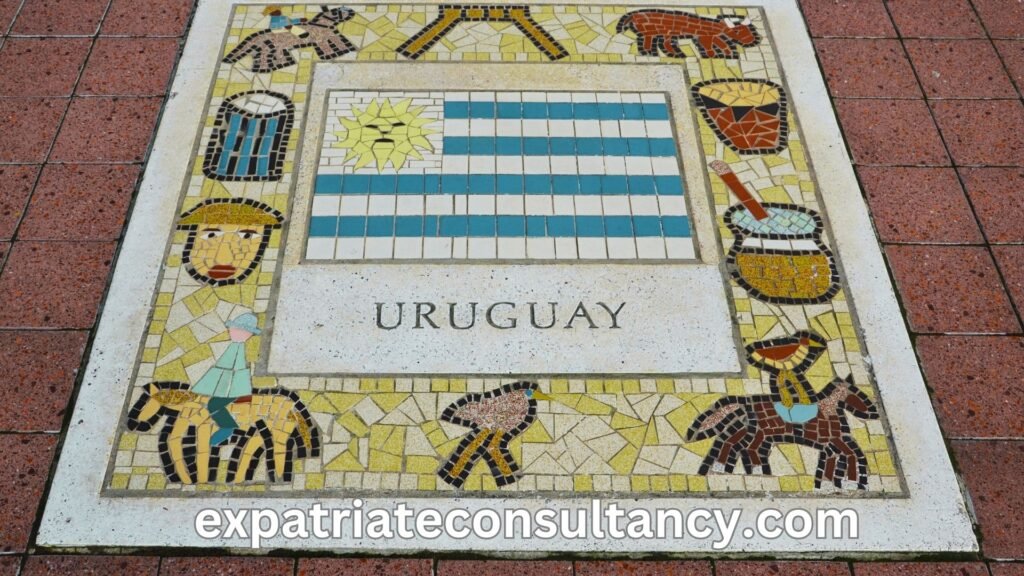Everything You Need to Know to Embrace a Relaxed Lifestyle and Retire in Uruguay.
Ps: Check also our Youtube Channel.
Amid the hustle and bustle of São Paulo, a former work colleague of mine, Felipe, recently told me about his idea of living elsewhere.
Why? Because it is very difficult to raise a family and have a relaxed life in an enormous, cyberpunk-like city like São Paulo.
When I asked which place he had in mind, he spoke of a place not too far from his homeland, Brazil, yet a world apart regarding tranquility and safety.
His eyes would light up as he painted a picture of Uruguay, a country he saw as a haven from the violence and chaos that had become all too familiar in his daily life.
For me, this idea was also very curious because the same tranquility that attracted Felipe to Uruguay attracts numerous retirees (not only from Brazil but also from Europe and the USA) to this South American country.
More than once people asked us to research and publish material about retirement in Uruguay, and the conversation with Felipe motivated me to do so.
If you have already read any of my other articles about retirement abroad, you can jump straight to the first subtitle (Pros of retiring in Uruguay – Why retirees choose Uruguay). If not, keep reading to get some context.

My company helps expats. Many of these people know what they want and just need help. What about retiring in X? What’s your opinion? they ask me.
We already wrote some highly popular pieces, like this with the best countries to retire in high style (even If you are young), or this about the cities in South America with the lowest cost of living.
Often I don’t know what to say. I tell my team to research the destination and write a detailed report so I can give our customers the information they need.
Not surprisingly, most of the destinations are warm places with idyllic beaches.
After a few years of doing this, we researched and wrote about multiple Caribbean Islands and Central American countries.
Below is the resumed version of some reports we did, available for free for you:
Puerto Rico: The main reason to retire in Puerto Rico might be a word with only 3 letters.
Republica Dominicana: The Fascination of Retirees and Digital Nomads With This Caribbean Destination
Nicaragua: How a Central-American Country Safer Than Delaware Became Popular Among Pensioners
Jamaica: The Insane Economics Behind the Idea of Retirement in Jamaica
Panamá: The Not-So-Secret Oasis for Foreign Pensioners: A Low Tax Gem in Central America
Read also: The Best European Cities to Retire to

Pros of retiring in Uruguay – Why retirees choose Uruguay
Felipe’s story is not unique. The escalating violence in some places like large cities in the US, Brazil, or even Europe (discover here the most dangerous European cities) has led many to seek refuge elsewhere, and Uruguay, with its peaceful ambiance and welcoming culture, has emerged as a popular choice.
The prospect of working remotely (or just resting) from the tranquil beaches of Punta del Este or retiring amidst the charming colonial architecture of Montevideo is a dream that many, like my colleague Felipe, are beginning to entertain.
Yet, this dream is not without its challenges and uncertainties. First let’s talk about the pros, then the cons, and lastly the cost of living in Uruguay.
High quality of life
Uruguay’s quality of life is reflected in its Human Development Index (HDI), a measure that assesses three basic dimensions of human development: health, education, and income.
According to the latest data from the United Nations Development Programme, Uruguay ranks highly on the HDI: 0.809 points in the last UN report, leaving it in 59th place in the table of 191 countries published, a level of development way higher than other countries in Latin America.
Are we saying that Uruguay is a developed country? Not really, but it is not far either, at least when compared to other South American countries. It’s a beacon of stability and progress in a region often characterized by volatility.

Affordable healthcare options
The country is home to high-quality private medical institutions that offer services at a fraction of the cost compared to U.S. hospitals.
For instance, the British Hospital in Montevideo is a renowned institution known for its top-notch medical services and English-speaking staff. These affordable healthcare options not only ensure that retirees have access to excellent medical care, but also contribute to a lower cost of living, making Uruguay a desirable retirement destination.
Read also: The best countries in the world for medical education.

Stable political and economic environment
While countries like Argentina, Brazil, Peru, and Bolivia are famous for their consecutive leadership changes, impeachments, and even the eventual civil conflicts, Uruguay stands apart in terms of stability.
Uruguay’s stability is no accident; it has been established through a combination of factors, including prudent economic policies and a solid judicial system.
The country has adopted responsible fiscal and monetary policies, avoiding the unsustainable debt levels and economic crises experienced by several countries in the region. This has allowed the country to maintain consistent growth rates and attract foreign investment.
Additionally, the government has focused on diversifying its economy and creating a strong export market to protect it from external shocks. Once with an economy based on exports of wool and meat, today Uruguay is responsible for almost 10% of the international tourism in South America.
Pleasant climate
Uruguay’s climate is another factor that makes it an attractive destination for retirees. The country experiences a temperate climate, with four distinct seasons, none of which are extreme.
This means that retirees can enjoy a variety of activities throughout the year without the discomfort of excessive heat, cold, or humidity.
Summers in Uruguay, from December to March, are warm with temperatures averaging around 28°C (82°F), perfect for enjoying the country’s beautiful beaches and outdoor activities. Winters, from June to September, are mild with temperatures rarely dropping below 10°C (50°F).
This is a stark contrast to the harsh winters experienced in many parts of North America and Europe, making Uruguay a particularly appealing retirement destination for those looking to escape colder climates – yeyyy, relief from arthritis!
Welcoming and friendly people
One of the most compelling aspects of Uruguay as a retirement destination is the warmth and friendliness of its people. Known for their hospitality,
Uruguayans are welcoming to foreigners, making it easier for retirees to integrate into the local culture and feel at home. The country’s small size and population foster a close-knit community atmosphere, where neighbors know each other and are always ready to lend a helping hand.
This welcoming attitude extends to the expatriate community, making Uruguay an attractive place for those seeking a peaceful and friendly environment for their retirement years. Whether it’s in the vibrant city of Montevideo or the tranquil beach towns, retirees in Uruguay can expect a warm welcome and a sense of belonging.

Low crime rates
Uruguay’s low crime rates when compared to what one could expect from a Latin American country are a significant draw for those seeking a peaceful retirement.
According to the Global Study on Homicide by the United Nations Office on Drugs and Crime (UNODC), Uruguay’s homicide rate is one of the lowest in South America. Here’s how it compares to other countries in the region:
- Uruguay: 8.2 homicides per 100,000 inhabitants. This is a number similar to the US murder rate.
- Brazil: 27.8 homicides per 100,000 inhabitants
- Colombia: 24.9 homicides per 100,000 inhabitants
- Venezuela: 56.8 homicides per 100,000 inhabitants
These figures reveal a stark contrast. The low crime rates in Uruguay contribute to a sense of safety and security, making it an attractive destination for retirees.
Cons of retiring in Uruguay
It is Quite Far From America and Europe
One of the challenges of retiring in Uruguay is its geographical distance from North America and Europe. This can make travel to and from the country quite lengthy and potentially inconvenient. For instance, a direct flight from New York to Montevideo, Uruguay’s capital, can take around 11 hours. From London, it can take upwards of 14 hours, often with at least one stopover.
Furthermore, direct flights to Uruguay from many U.S. or European cities are not always readily available. This means that travelers may need to make one or more stopovers, often in other South American countries like Brazil or Argentina, which can add to the travel time and complexity of the journey.
This leads us to our next point…
Difficulties in visiting family and friends back home

This is probably the most important negative aspect of all when we talk about a move to Uruguay.
The geographical distanceto North America or Europe can pose significant challenges for expats trying to keep close ties with family and friends back home. The long and often complex travel arrangements required can make frequent visits difficult.
Firstly, the lengthy flight times can be physically demanding, especially for older retirees. The journey often involves long hours in transit, potential layovers, and the associated stresses of travel such as navigating unfamiliar airports or dealing with flight delays or cancellations.
Secondly, the lack of direct flights to many U.S. or European cities means that planning a trip home can be a complex process. It often involves coordinating multiple flights and potentially dealing with the additional requirements of transiting through other countries.
Finally, the time and cost associated with these long-distance trips can be prohibitive. This sense of distance and separation can be a significant drawback for those considering making Uruguay their retirement home.
Bureaucracy
Like many Latin American countries, Uruguay has its share of red tape, which can be frustrating for those accustomed to more efficient systems.
Whether it’s dealing with property transactions, setting up utilities, or navigating the healthcare system, expats may find that processes can be slow and require a significant amount of paperwork.
A personal testimonial from a British expat living in Uruguay provides a practical example of the bureaucratic challenges one might face in the country. The author mentions the convoluted tax system as a significant source of frustration. Despite Uruguayans’ adherence to rules and regulations, the tax system is so complex that even individuals with a background in business administration find it difficult to navigate.
Potential Cultural Differences and adaptation challenges (The “mañana” Culture)
Another aspect to consider is the cultural differences. Uruguay, like many other Latin American countries, operates on what is colloquially known as “mañana” culture.
The term “mañana” (meaning “tomorrow” in Spanish) is often used to describe a more relaxed attitude towards time and deadlines. This can be a significant shift for those coming from cultures where punctuality and strict adherence to schedules are the norms. It’s not uncommon for appointments to run late, or for tasks to take longer than initially anticipated.
While this laid-back approach can be part of Uruguay’s charm, it can also be a source of frustration for those unaccustomed to it.
The cost of living might not be as low as in other South American countries
The cost of living in Uruguay, particularly in its capital city Montevideo, is relatively high compared to other South American countries. According to Numbeo, as of 2023, Montevideo has a Cost of Living Index of 59.4, which is higher than Santiago, Chile (52.2), Sao Paulo, Brazil (44.2), and Buenos Aires, Argentina (30.5).
The higher cost of living was one of the reasons that in the ranking of the best countries to live in Latin America, Uruguay was way below Argentina or Chile.
Costs of Retiring in Uruguay
Healthcare and insurance costs
In Uruguay, private healthcare and health insurance are way, way, way cheaper than in the US.
For example, a private plan at La Asistencial costs $57 per month, with a VIP plan costing $154 per month.
There are multiple other providers in the country, and even the premium Hospital Britanico will still cost less than half of what medical care would cost in the US.
In the US, health insurance costs vary based on factors like age, income, and location. In 2020, the average monthly cost was $456 for an individual.
Comparing urban, suburban, and rural living options
In the bustling urban center of Montevideo, the capital city, the cost of living can be higher than in other parts of the country. According to Numbeo, as of June 2023, the average monthly rent for a one-bedroom apartment in the city center is approximately 22,106.62 Uruguayan Pesos (UYU), while a three-bedroom apartment goes for around 36,662.71 UYU.
(For more prices in USD check our table a few paragraphs below)
Suburban living, on the other hand, offers a more affordable alternative. The same one-bedroom apartment outside the city center costs about 17,659.47 UYU per month, and a three-bedroom apartment is around 33,306.09 UYU.
Rural living in Uruguay is even more cost-effective, although specific data is harder to come by. However, it’s reasonable to assume that housing costs are significantly lower than in urban or suburban areas, given the trend in most countries.
Real estate and rental costs
Even the most expensive city in Uruguay (Montevideo), has a square meter 50% cheaper than the US average, For more information check our table a few paragraphs below
Comparing the Cost of living
It’s time for a comparison of the cost of living in Uruguay. I will not compare the living costs in Uruguay with those of New York or London, because nearly anywhere in the world is cheaper than those two cities.
Let’s compare the cost of living in Montevideo (Uruguay) with the best city for retirement in Europe (Valencia, Spain) and one of the favorite cities for pensioners in the USA (Tampa, Florida).
All prices are from Numbeo and Expatistan, two websites that crowdsource prices and living costs from thousands of users and contributors. Be aware that Montevideo is likely one of the most expensive places in Uruguy, and smaller cities tend to be even cheaper.
Other towns that can be suggested for those seeking retirement in Uruguay are Atlántida and La Paloma.
| Values in USD | Montevideo | Valencia | Tampa |
| Meal for 1 Person, Inexpensive Restaurant | 14.47 | 13.12 | 21 |
| Domestic Beer (0.5-liter draught) in a Supermarket | 2.25 | 2.9 | 2.29 |
| Eggs (regular) (12) | 4.21 | 1.98 | 4.8 |
| Chicken Fillets (1kg) | 9.95 | 7.5 | 10.94 |
| Gasoline (1 liter) | 2.02 | 1.78 | 0.94 |
| Utilities (Electricity, Water, Garbage, etc.) for 85m2 Apartment, monthly | 151.17 | 145.07 | 189.96 |
| Internet (60 Mbps or More) | 40.95 | 31.32 | 69.03 |
| Cinema, International Release, 1 Seat | 10.51 | 8.75 | 15 |
| Short visit to private doctor (15 minutes) | 44.55 | 73 | 104 |
| Standard men’s haircut in an expat area of the city | 14 | 20 | 25 |
| Rent of an apartment (1 bedroom) | 602.23 | 895.16 | 2,065.90 |
| Price per Square Meter to Buy an Apartment | 2,442.17 | 2,653.25 | 6,020.13 |
The Uruguay Retirement Visa
For more detailed information, you can visit this page on retirement visas nd look for the section about Uruguay.
But a hint: the requirements are considerably lower than in most European countries.
Taxes in Uruguay For Foreigners
Uruguay has a territorial tax system, which is particularly beneficial for foreigners, especially retirees with income from abroad. This system means that Uruguay doesn’t tax foreign-sourced income. So, if you’re a retiree living in Uruguay with a pension or other income from your home country, you won’t be taxed on that income by the Uruguayan government.
Capital gains from selling Uruguayan property are also considered as capital income and are taxed at 12%. The taxable capital gains are the difference between the sales price and acquisition costs, as adjusted for inflation in accordance with the changes in the consumer price index.
It’s important to remember that while Uruguay’s tax system can be advantageous for retirees, it’s always recommended to consult with a tax professional to understand the full implications of your specific situation. For more detailed information, you can visit this

Best Places to Retire and Live in Uruguay
Atlantida: The Friendly Beach Town
Atlantida is a charming beach town located on the southern coast of Uruguay, about an hour east of Montevideo. Originally a resort destination for the wealthy, Atlantida has evolved into a middle-class resort with about 5,000 year-round residents. Expats describe Atlantida as having an eclectic mix of well-traveled locals and foreigners.
The beaches are fairly empty except for mid-December to the end of February, making it a peaceful retreat for most of the year. The town offers an easy drive or bus ride into Montevideo, making it a perfect blend of beach life and city amenities. Learn more about Atlantida.
La Paloma: The Natural Paradise
La Paloma is a small town located on the eastern coast of Uruguay, about 2.25 hours east of Montevideo. Known for its natural beauty, La Paloma offers a small-town atmosphere with the delight of a lagoon and beautiful beaches.
The town is a popular destination for those who value pure air, clean water, and unprocessed foods. The community is welcoming, and the lifestyle is relaxed, making it an ideal place for retirees looking for a slower pace of life. Discover more about La Paloma.
Montevideo: The Cosmopolitan Capital

Montevideo, the capital of Uruguay, is home to a large expat community. The city is known for its beautiful architecture, modern amenities, and warm, welcoming people.
Despite having a population of about 1.7 million, Montevideo has a small-town feel due to its friendly locals. The city is very walkable, and public transportation is widely used, making it easy to get around. Montevideo offers a blend of city life with a relaxed atmosphere, making it a great place for expats to retire. Explore more about Montevideo.
Punta del Este: The Luxurious Resort City

Punta del Este is a popular resort destination on the Atlantic coast with approximately 10,000 full-time residents. Known for its high-end resorts and beautiful beaches, Punta del Este is a place where you can live a luxurious lifestyle.
The city offers a range of services, from tailoring to medical care, at affordable prices. Despite being a resort city, Punta del Este has a welcoming community that values a good quality of life. Find out more about Punta del Este.
Read also: The Best Cities for Remote Workers in 2023

Conclusion – Weighing the Pros and Cons of Retiring in Uruguay
Uruguay offers a comfortable life for retirees with its high standard of living and affordable living costs. Known for its beautiful coastal towns and vibrant city life.
It is probably the the best places to retire in South America (although smaller towns in Argentina are great for retirees with income in USD). The country’s capital, Montevideo, and the popular resort city of Punta del Este are popular places for expats, offering a cosmopolitan lifestyle that rivals any major city.
To enter Uruguay and enjoy these benefits, one can apply for a Uruguay retirement visa (more about it in the paragraphs above). This process involves meeting an income requirement and submitting an application, which can take a few years to process.
Once approved, you become a resident of Uruguay and are issued an ID card. This residency can be a stepping stone towards obtaining citizenship and a passport, further solidifying your ties to the country.
Uruguay boasts a robust private healthcare system (more about it in previous paragraphs). The quality of healthcare in Uruguay is among the best in South America, and the national average cost is reasonable. Housing in Uruguay is also affordable, with a variety of properties available for purchase or rent.
Retiring in Uruguay piques the interest of many due to its territorial tax system. This means that Uruguay doesn’t tax foreign-sourced income, making it an attractive option for those saving for retirement. However, remember that Uruguay also has its own set of taxes that residents must adhere to.
In conclusion, if you want to retire in Uruguay, the process may be lengthy, but the benefits are worth it due to the relatively low costs and the high standard of living, it’s no wonder that Uruguay continues to rank highly as a retirement destination for those that don’t mind living in a place far away from Europe and the US.
Encouraging potential retirees to visit and explore the country for a first-hand experience
Before deciding to move to any country, visit it first, at least a couple of times in different seasons.
As travel insurance for visiting Uruguay (and any country in Latin America), we recommend Ekta.
Here Are Some Other Great Places You Can Retire On A Budget
- The Dreamy Destination That’s 50% Cheaper to Live In than Spain
- Retirees Choose This Country Due to Low Costs and Simple Pleasures… But Is It Safe?
If you enjoyed this article about retire in Uruguay, here are a few other reading suggestions for you:
- The Favorite Country for Americans to Retire (By Far) and Why So Many Do So
- Why Did Over 29,000 Americans Choose Italy to Retire To?
- Pros & Cons of Retiring in a Place Where Days Can Last for 19 Hours
- Why Did 7539 American Pensioners (And Lewis Hamilton) Move to This Tiny Country?
Subscribe (for free) to receive my articles directly in your inbox and receive a special gift. If you enjoy this article, please consider becoming a Medium member by using this link and have access to premium, unbiased content from authors not tied to big media.
Levi Borba is the founder of The Expatriate Consultancy, creator of the channel The Expat, and best-selling author. Some of the links in this article may be affiliate links, meaning that the author will have a commission for any transactions.




